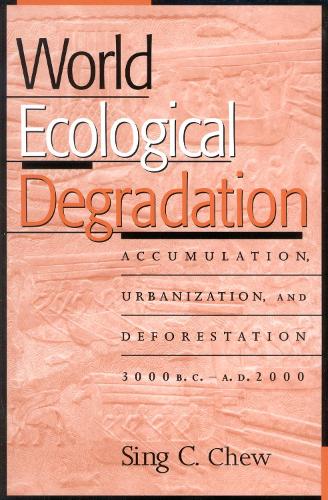
World Ecological Degradation: Accumulation, Urbanization, and Deforestation, 3000BC-AD2000
(Paperback)
Publishing Details
World Ecological Degradation: Accumulation, Urbanization, and Deforestation, 3000BC-AD2000
By (Author) Sing C. Chew
AltaMira Press
AltaMira Press
25th May 2001
United States
Classifications
General
Non Fiction
Sustainability
333.709
Physical Properties
Paperback
232
Width 149mm, Height 227mm, Spine 15mm
367g
Description
Deforestation, soil runoff, salination and pollution, all recurrent themes of the contemporary world, but they are not new to the world. This is a sweeping review of the environmental impacts of human settlement and development worldwide over the past 5000 years. The book shows that the processes of population growth, intense resource accumulation and urbanization in ancient and modern societies almost universally bring on ecological disaster, which can often contribute to the fall of that society. It then looks at the modern European world-system and its impact on the environment. The author, Sing Chew, also traces the existence of environmental conservation ideas and movements over the 5000 year span, and challenges the reader to change long-term trends of ecological disaster.
Reviews
Sing Chew's book is an outstanding contribution to environmental history. By utilizing world systems theory and presenting the pattern of overuse of resources by many different civilizations as they attempted to grow their empires over the past five thousand years, he demonstrates that our current ecological crisis is larger in scale but not different in fundamental form from historical patterns of resource exploitation. This book should be on the 'must read' list for all students of environmental history, environmental studies, and environmental philosophy. -- Bill Devall, (Director, Deep Ecology Resource Center)
Where there has been surplus accumulation there has been an abuse of nature, argues Chew. It happens throughout history. It isn't new. That's his argument and it's a good one. -- Albert Bergesen, University of Arizona
Sing C. Chew suggests that ecological degradation due to economic (over)exploitation was a major historical force in world history since the 3rd millennium B.C. and he has assembled an impressive collection of evidence from archaeology, ancient history and historical ecology to underpin his case. The book adds an important new perspective to world system theory, especially centre-periphery dynamics, and to explaining 'Dark Ages.' World Ecological Degradation continues in the tradition of the grand historical narrative from Eric Wolf, Alfred Crosby, William McNeill and Gunder Frank. As such it will be of great interest to social and economic history as well as ancient history and archaeology. -- Kristian Kristiansen, (University of Gothenburg)
Chew demonstrates that ecological crises caused by accumulation, urbanization, and deforestation inevitably have caused the collapse of many ancient civilizations and more recent socioeconomic transformations... His ecocentric, or 'ecology in command' approach, rather than the traditional anthropocentric, or 'economy in command' approach, opens a new dimension in studying human history at a broader temporal scale. -- P.P. Mou, (University of North Carolina at Greensboro) * Choice Reviews *
Chew offers a cogent overview of deforestation over the past five thousand years. In so doing, not only does he link his work to the recent studies in world system theory, but he also dispels much of the romanticism that often lurks in environmental studies by showing that forest loss was widespread even among nonmodern societies. Such factors should make World Ecological Degradation a provocative read for upper-level students in history and environmental studies. -- Karl Jacoby, Brown University * History *
The degradation of nature especially through deforesting is 'as old as the hills.' Chew masterfully demonstrates the conflict between culture/society/economy in command and its environmental destruction that in turn imposes limits through ecology in command. He reviews these over 5,000 years around the globe from ancient Mesopotamia and India, Greece and Rome, South, East and Southeast Asia to the European and North American age in this first ever ecocentric instead of only humanocentric book that weds ecological with world system analysis. He also traces responses in ecological consciousness and through environmental movements from the 2700 BC Epic of Gilgamesh in Mesopotamia, Vedas and Buddhism in India, Confucians in China, Pythagoras and others in Greece, Cicero and Pliny in Rome, Spinoza in Europe and Thoreau in the United States, and to contemporary ones like the Sierra Club, Greenpeace and Green parties like Nader's 2000 presidential candidacy today. -- Andre Gunder Frank
Of the attempts in the past fifteen years to offer a synthetic, global history of environmental degradation, Sing C. Chew's book is not only the most ambitious but also perhaps the most successful to date.... It is a pleasure to note that despite his concise format, Chew's work may be the first to satisfy the demands for documentation that historians typically make of the books they use. -- Michael Kucher, University of Washington, Tacoma * Environmental History *
In this brief by biting analysis of world environmental history from the appearance of the first cities to the present, Sing Chew states his thesis and follows it with admirable directness.... I think this book wil prove stimulating for teachers of courses in World History; there are issues raised by Chew that most texts avoid. -- J Donald Hughes
Author Bio
Sing C. Chew is professor and chairperson of the Department of Sociology at Humboldt State University, in Arcata, California. Prior to his current appointment, he was the Associate Director in the Office of Vice-President (Resources), International Development Research Centre, Ottawa, Canada. He has been a Research Fellow at the Institute of Southeast Asian Studies (ISEAS) in Singapore, and recently, Guest Researcher at the Human Ecology Division, Lund University, Lund, Sweden, where this book was completed. His most recent book is a co-edited volume: The Underdevelopment of Development: Essays in Honor of Andre Gunder Frank.
